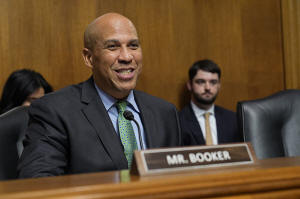Democrats' new digital strategy tops trending charts but also draws
mockery from allies and foes
[March 22, 2025]
By MATT BROWN
WASHINGTON (AP) — For weeks, Democratic lawmakers have met with and
mimicked figures they believe may offer them a path back to power in
Washington: online influencers and content creators.
Hours before President Donald Trump’s joint address to Congress this
month, Senate Democrats huddled with a dozen online progressive
personalities who have millions of followers. House Democrats were
introduced, without staff, to 40 content creators who Democratic leaders
said could help them grow their audience online.
An earlier tutorial session in February featured online personalities
like the YouTube commentator Brian Tyler Cohen.
The result has been a burst of Democratic online content, including
direct-to-camera explainers in parked cars, scripted vertical videos,
podcast appearances and livestreams — some topping trending charts
online, others drawing mockery from liberal allies and Republicans in
Congress.
But while the Democratic Party is largely divided over the path forward
after last year's election losses, party leaders agree that, no matter
the message, how they connect with voters in the digital media landscape
will be key to a political comeback.

Democrats are aiming to double engagement with digital content
More than a dozen Democratic senators, asked about the party’s digital
strategy, pointed to Sen. Cory Booker of New Jersey as the architect of
their new push.
“We’ve seen tremendous growth of Democratic senators now. They’re
engaging in the tools and strategies necessary to elevate their voice in
a new, changing media market, where legacy media is not the place that
people get their news now,” Booker said. “We’re just weeks into this,
but just by making key changes ... we’re seeing a massive growth in
engagement with the content that our senators are creating, and we’ve
only just begun."
Booker said he's aiming for Democratic senators to double online
engagement with their content over the next year — and early metrics
have been noticeable. Democratic senators racked up more than 87 million
views on content they published in response to Trump's joint address to
Congress, according to Booker's office.
But the Democrats’ digital efforts also draw Republican mockery
Not all of that online engagement is positive. After more than two dozen
Democratic senators posted identical scripted videos knocking Trump's
speech, saying he should have addressed the cost of living and his
support for billionaire adviser Elon Musk, conservatives mocked them as
inauthentic and out of touch.

"They are all actors reading a script," Musk wrote on X, the social
media platform he owns.
There's no doubt that Democrats are playing catch-up. Trump and his
fellow Republicans built a digital operation that fed on bombast and
celebrity, and it's a strategy they've taken with them to the White
House. Official government accounts are new filled with right-wing
memes, cinematic videos and pugnacious statements.
The Democratic embrace of influencers has also yielded mixed early
results. Democrats were ridiculed online after a food and wellness
influencer who attended the House Democrats' creators event created a
“Choose Your Fighter" video collage of Democratic congresswomen for
Women's History Month.
The White House posted a video in response that read “America chose its
fighters last November,” and the Pentagon, normally known for being
studiously non-partisan, posted a video stating “We chose our fighters a
long time ago.”
But Booker and other Democratic leaders don't consider the sneers to be
a downside. Missteps are to be expected, they say, but the path to
Americans' attention will require some discomfort from lawmakers.
[to top of second column]
|

Sen. Cory Booker, D-N.J., speaks during a hearing on Capitol Hill in
Washington, May 21, 2024. (AP Photo/Susan Walsh, File)

“I do think that the caucus as a whole is trying to figure out how
we show people that we are real people,” said Rep. Jasmine Crockett
of Texas, one of the congresswomen featured in the viral “Fighter”
video. Crockett, whose posts regularly garner millions of views
online, said she was used to criticism for her often frank
statements and was more interested in combating perceptions that
Democrats are “elitist” or “robotic.”
“I didn't like the jumping, I'm going to be honest, though,”
Crockett added about the viral “Choose Your Fighter” video.
Trump prompts a more aggressive digital posture
Democrats adopted a more combative stance online in recent weeks as
Trump's moves to slash the federal workforce drew protests from
liberals and pushback at GOP town halls. Top Democratic digital
operatives who worked for the 2024 presidential campaign of
then-Vice President Kamala Harris have been in high demand, with
many Democrats anticipating close 2026 races in which digital
strategies may be key.
Some of the most prominent Democrats across the country have been
engaging more in new media since the election. House Minority Leader
Hakeem Jeffries of New York has touted the party's message on
progressive podcasts over the last month, including from the
comedian Jon Stewart and the progressive outlet MeidasTouch. Clips
of those videos were also lampooned online but garnered millions of
views.
California Gov. Gavin Newsom, a potential Democratic presidential
contender in 2028, has launched a podcast of his own on which he has
welcomed close Trump allies like the right-wing activist Charlie
Kirk and former Trump aide Steve Bannon to discuss hot-button
political topics.
“We want to make sure we hit the podcasters that normally don’t have
Democrats on there,” said Rep. Derek Tran, a Democrat from a
competitive California House district. “The ones that are more
right-leaning or independent, and be able to address a crowd and an
audience that’s not typical for the Democratic base.”
Democrats divide on message vs. messaging
Some House Democrats have expressed frustration that the guidance
from Democratic leaders about social media is too vague, while
others grumble that leaders are too prescriptive in their approach
to messaging on platforms they don’t intuitively understand.
Meanwhile, Democratic strategists have cautioned lawmakers that
garnering attention online is secondary to the goal of using social
media as a tool in specific policy fights and campaigns.
“I think there’s a fine line before we’re being cringe and trying
too hard and seeming too thirsty. I think the most important thing
in any of this is being as authentic and genuine as we can be,” said
Rep. Sara Jacobs, D-Calif.
“When it comes to authenticity, it also means leaning into what
makes each of us unique. Like many of my colleagues probably should
not be doing ‘get ready with me’ videos. It would look super cringe.
But I’m a 36-year-old woman, and I do my makeup all the time, and I
watch a lot of makeup tutorial videos, so it makes sense for me to
do it,” said Jacobs.
Some Democrats think that the party's messaging strategy hinges as
much on the messengers as the medium it’s communicated on.
“If you know how to talk to people, it doesn’t matter what medium is
going to exist,” said Sen. Ruben Gallego, a freshman Democratic
senator from Arizona. “You could be the best freaking spokesperson
in the world, but if you don’t know how to talk to working-class
people, it doesn’t matter if you have the best TikTok following,
it’s just not going to translate.”
All contents © copyright 2025 Associated Press. All rights reserved |